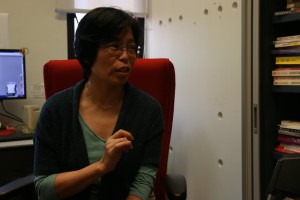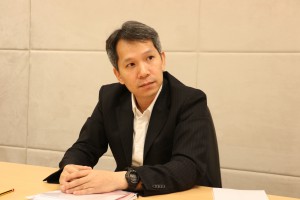Feminist scholar Luk Kit-ling, chairperson of the Association for the Advancement of Feminism, believes the attacks on women in protests are both political and gendered.
“It is political in the sense that the attack is to scare and deter people’s participation. It is gendered because it uses sexual violence and sexual harassment to rule out women in their civic participation.”
Luk believes sexual attacks always adhere to the dominant ideology of society at large, whether the attacks are on women or on men.

“Women attract more attacks in the public arena as they are assumed to be domestic and belong to the private domain,” Luk explains, adding that the attacks on women suggest that the female body is a passive object and that women live their lives as objects for another’s gaze.
Luk says negative comments help construct a view of the female body as something vulnerable, as a source of horror and shame rather than as a source of pleasure, fertility and empowerment.
Even positive comments, such as calling a female protester a “goddess” impose certain standards and expectations of femininity on all women.
“It is important to diversify femininities and to liberate people from their gender boundaries, even for men,” she adds. “Sayings such as ‘real men should be defending Mong Kok’ also address gender boundaries that are supported by the patriarchal society.”
While there is still debate on whether sexual slurs against women in politics and at protests is gender discrimination or just a political issue, there is little argument that sexual harassment of women in protests is really sexual harassment. However, there are no laws to protect women’s rights in protests and in politics.
Ivan Luk Chi-cheung, chief legal counsel for the Equal Opportunities Commission (EOC), says there is inadequate protection for women at protests as the current regulations only cover sexual harassment in certain fields, such as employment, education and the provision of goods and services.
Luk explains the law only covers physical assaults, not verbal sex attacks in social movements or on the streets. He agrees the scope of the law should be expanded as he has noticed the sexual harassment of women protesters has increased in recent years.

The EOC conducted a review of Hong Kong’s anti-discrimination legislation last year, and protecting women in protests was one of the things discussed. However, Luk says it was not included in the final consultation document. “We suggested expanding the scope of protection from sexual harassment, but it should be done step by step. If we suddenly expand it from harassment in employment to [harassment from] strangers, it may not be realistic in a short period of time,” says Luk.
In the meantime, he believes education is necessary to change the culture that allows harassment to flourish. Here he finds agreement from Luk Kit-ling (not a relation), who also notes this is easier said than done. “Sometimes it is quite discouraging, but the female liberation movement will not end. We have to continuously change the old ideas because conservative forces are always more powerful than us,” she says.
Edited by Angel Liu






































